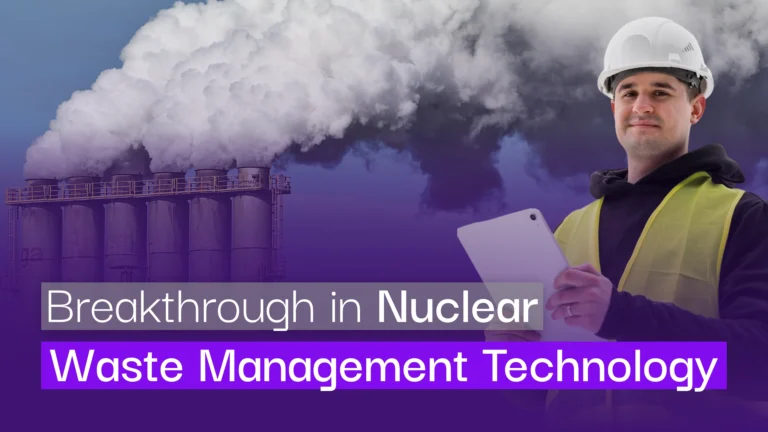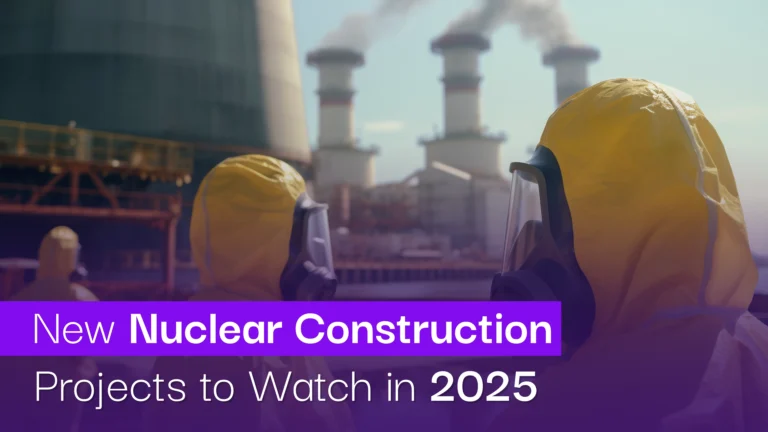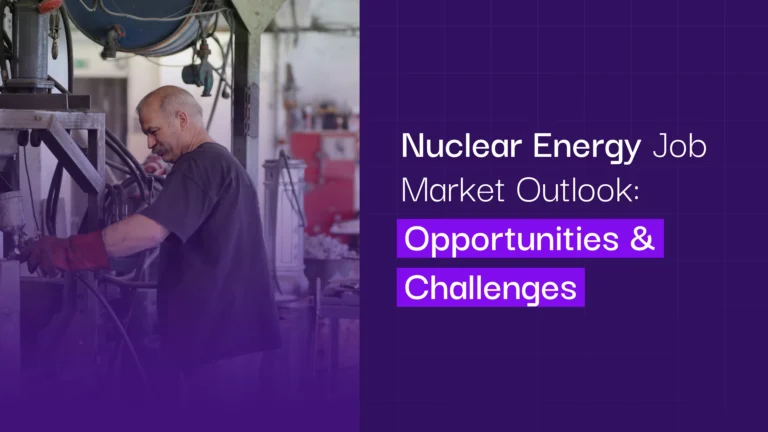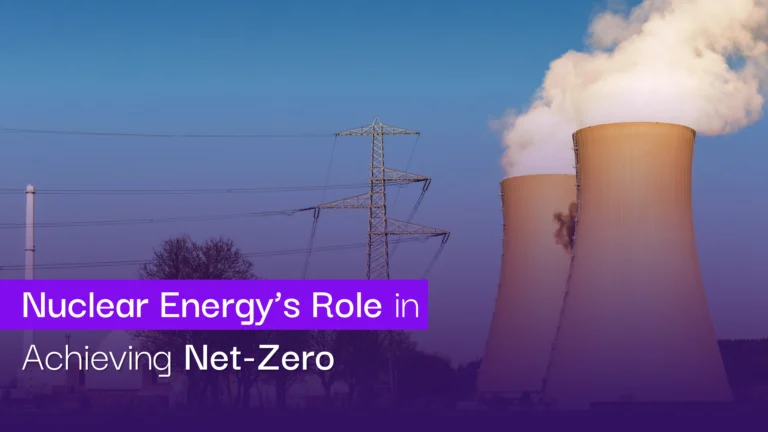How AI and Robotics Are Changing the Nuclear Industry
The nuclear industry is entering a new era, one where artificial intelligence (AI) and robotics are no longer futuristic concepts but essential tools for safety, efficiency, and innovation. From advanced monitoring in Nuclear SMR (Small Modular Reactor) plants to robotic systems performing remote operations in hazardous environments, technology is transforming how nuclear facilities are designed, built, and maintained.
For this shift to succeed, the industry needs skilled people who can work at the intersection of engineering and digital technology. That’s where TRX International plays a vital role, offering expert nuclear recruitment and nuclear staffing solutions to connect employers with nuclear workforce specialists who can drive this transformation. Today, companies across the globe are actively looking to hire nuclear engineers, recruit nuclear professionals, and hire nuclear technical staff who can bridge traditional nuclear expertise with the latest in digital innovation.
Why AI and Robotics Matter in the Nuclear Sector
Nuclear facilities operate in highly regulated environments where safety is always the number one priority. The margin for error is small, and human oversight has historically been the backbone of plant operations. However, with AI and robotics, the sector can enhance safety while reducing risk to personnel.
Key benefits include:
- Improved Safety: Robotics can take over tasks in high-radiation environments, minimizing human exposure.
- Increased Efficiency: AI-driven predictive maintenance reduces downtime and ensures smoother plant operations.
- Cost Savings: Automated inspections and real-time monitoring lower operational costs.
- Data-Driven Decisions: AI enables operators to analyze massive datasets quickly, helping identify issues before they become problems.
In modern nuclear power jobs, these technologies are becoming indispensable. It’s no longer enough for engineers and operators to understand just mechanical systems, they must also be familiar with digital platforms and smart technologies. This evolution is reshaping nuclear careers, creating opportunities for individuals who can integrate both worlds. Employers may now seek to hire nuclear specialists who can oversee AI-based safety systems or recruit nuclear experts capable of training robots for precision maintenance.
AI in Nuclear Operations
Artificial intelligence is being integrated into almost every stage of nuclear operations.
- Predictive Maintenance: Sensors installed across a plant feed real-time data into AI systems that can detect anomalies before they cause equipment failures. For example, an AI algorithm might flag unusual vibrations in a turbine, allowing technicians to address the issue before it disrupts power generation.
- Reactor Optimization: AI can adjust reactor settings to maximize efficiency and reduce fuel waste. This not only cuts costs but also lowers environmental impact.
- Regulatory Compliance: Maintaining compliance requires extensive documentation. AI tools streamline this process by automatically generating reports, ensuring nothing is overlooked during safety audits.
For nuclear small modular reactors, AI’s role is even more critical. SMRs are designed for flexibility and scalability, and their compact size allows for advanced digital integration. Remote monitoring systems, powered by AI, can manage multiple SMRs from a central control hub. TRX International is already placing candidates with specialized skills in AI-driven SMR projects. Companies looking to deploy these reactors may need to hire nuclear operators, recruit nuclear engineers, or even hire nuclear project managers who understand both nuclear science and AI systems.
Robotics in Nuclear Engineering and Maintenance
If AI is the brain, robotics is the hands of the new nuclear industry. Robots are revolutionizing engineering, construction, and maintenance work in nuclear facilities.
- Remote Handling: In areas where radiation levels are too high for humans, robotic arms and crawlers can carry out precision tasks.
- Automated Inspections: Drones equipped with cameras and sensors can inspect hard-to-reach reactor components, reducing the need for manual entry into hazardous zones.
- Decommissioning Support: Safely dismantling old reactors is a long, complex process. Robotics can cut, lift, and transport contaminated materials with minimal risk.
For professionals, this means that experience in robotics is now a valuable addition to a nuclear engineering CV. Employers are increasingly looking to hire nuclear contractors or recruit nuclear project teams with robotics expertise. In fact, TRX International has seen rising demand from organizations seeking to integrate robotics specialists into nuclear engineering jobs worldwide.
How AI and Robotics Are Changing Workforce Needs
The rise of digital technologies does not mean fewer jobs, it means different jobs. Instead of reducing opportunities, AI and robotics are creating demand for hybrid roles where technical expertise intersects with digital skills.
Some of the fastest-growing roles in the sector include:
- Engineers with AI and automation skills to integrate new technologies into existing plants.
- Data scientists who can interpret the vast streams of information generated by nuclear systems.
- Robotics technicians to design, maintain, and troubleshoot automated systems.
- Cybersecurity experts to protect plant control systems from digital threats.
This shift means nuclear recruitment is changing. Employers want candidates who are adaptable, innovative, and capable of navigating both nuclear science and cutting-edge technology. Organizations may choose to hire nuclear consultants, recruit nuclear safety specialists, or even invest in nuclear leadership talent to guide their digital transition.
TRX International plays a crucial role here, providing access to a global nuclear talent network. Through their nuclear recruitment services, they help employers identify professionals who can thrive in this evolving environment.
Supporting the Next Generation of Nuclear Specialists
AI and robotics adoption is not just about installing machines, it’s about preparing people to work alongside them. That’s where nuclear workforce specialists come in. These professionals are vital for training and mentoring the next generation of nuclear experts.
Traditional skills like regulatory compliance, safety management, and practical plant operations will remain essential. But combining these with digital literacy ensures that younger professionals are ready to lead the industry forward.
TRX International supports this by connecting employers with a blend of experienced experts and new recruits. Companies can hire nuclear scientists, recruit nuclear operators, and hire nuclear professionals across all levels, ensuring a balance of innovation and proven expertise.
Also Read: The Growth of Nuclear Fusion & How It Could Transform Energy Jobs
The Connection to Nuclear Fusion and SMRs
While AI and robotics are transforming today’s facilities, their role will be even greater in next-generation nuclear projects.
- Fusion Reactors: These advanced plants involve extreme temperatures and delicate systems where human access is limited. Robotics will be essential for maintaining plasma-facing components, while AI systems optimize reactor performance. Organizations are already beginning to recruit nuclear scientists and hire nuclear technical staff for fusion pilot projects.
- SMRs: With their modular, distributed nature, SMRs will depend heavily on automation. AI systems can manage multiple plants remotely, while robotics ensures safe, efficient maintenance. Employers seeking to scale SMR deployment may need to hire nuclear engineers worldwide or recruit nuclear specialists globally to support these efforts.
Investing in AI and robotics expertise now gives companies a head start in leading the future of nuclear.
Final Thoughts
AI and robotics are not replacing people in the nuclear industry, they’re empowering them. By enhancing safety, improving efficiency, and opening doors to new possibilities, these technologies are reshaping nuclear energy for the better.
For job seekers, this evolution means exciting new career paths in nuclear engineering jobs, from robotics integration to AI system management. For employers, it underscores the importance of securing the right talent at the right time.
That’s where TRX International makes the difference. By offering nuclear staffing solutions, they help organizations hire nuclear project managers, recruit nuclear professionals, and strengthen their teams with the expertise needed to thrive in this new era.
The nuclear industry has always been about precision, safety, and innovation. With AI and robotics, it’s entering its most transformative chapter yet, and the right talent will be the key to unlocking its full potential.
FAQs
Q1. How is AI used in the nuclear industry?
AI is applied in predictive maintenance, reactor optimization, and safety compliance. It analyzes operational data to improve plant performance and ensure regulatory standards. Organizations may need to hire nuclear engineers or recruit nuclear technical experts to oversee these systems.
Q2. What role do robotics play in nuclear power jobs?
Robotics handle tasks in high-radiation zones, conduct automated inspections, and support safe decommissioning. Employers often look to hire nuclear operators or recruit nuclear specialists who can manage and supervise robotic operations.
Q3. Are AI and robotics reducing the need for nuclear careers?
No. They are reshaping careers, creating hybrid roles that combine traditional nuclear expertise with digital and automation skills. Companies are actively seeking to hire nuclear consultants and recruit nuclear workforce specialists to fill these positions.
Q4. What is the link between AI, SMRs, and fusion?
AI and robotics are critical for next-generation plants. In SMRs, AI enhances remote operations, while in fusion, robotics enables maintenance inside extreme environments. This drives global demand to hire nuclear engineers worldwide and recruit nuclear project teams with specialized skills.
Q5. How can TRX International help employers in this space?
TRX International provides nuclear recruitment services, sourcing skilled candidates who understand both nuclear and digital systems. Employers can hire nuclear consultants, nuclear scientists, and nuclear workforce specialists through their extensive network.






